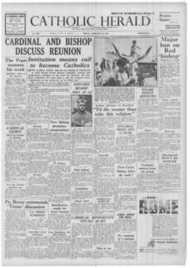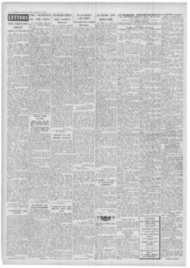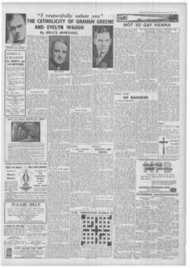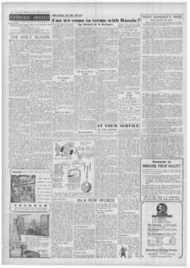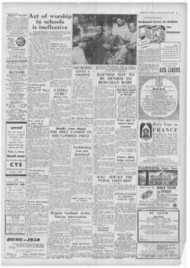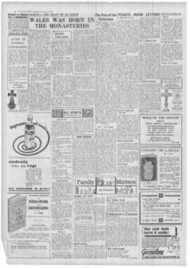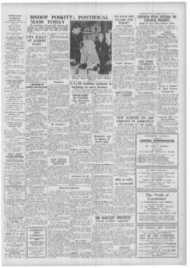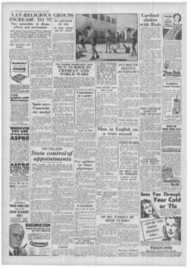Page 6, 24th February 1950
Page 6

Report an error
Noticed an error on this page?If you've noticed an error in this article please click here to report it.
Tags
Share
Related articles
National Saints
St David Of Wales (march 1)
Understandin The Welsh
A Minor St George's Day?
For The Feast Of St. David, Father Of Wales
WALES WAS BORN IN THE MONASTERIES
by HENRY EDWARDS
NEXT Wednesday in Wales and in Herefordshire the festival of St. David, Patron of Wales, will be celebrated as a great feast (a double of the first class), a circumstance which will be strangely unknown to thousands of Catholics in Wales who will come to church sixteen days later to honour the patron of Ireland. That, if I may say so, is a delightful I-Tibernianism, for it is probable that Dewi Sant was as Irish as St. Patrick was Welsh.
Now it is an excellent practice for Catholics of Irish stock to assist at Mass on St. Patrick's Day. But I am extremely eager that they should assist also on Dydd Dewi Sant. And there is a special reason why they
should. Ti is that the people of Wales became a nation through St. David and his fellow monks. That statement must be amplified.
The "Displaced " of the 5th century In the dark fifth and sixth centuries thousands of refugees,—" displaced persons," as we would call them now -belonging to such British tribes as the Brigantes or the Iceni, fled into what is now called Wales.
Probably " Wales" included Westmorland and Cumberland and Furness and certainly Cornwall; and the Welsh Marches even now do not describe the old frontiers.
But the horde , of D.P.s mingled with the Silures and the Ordovicii and the Demetae, and there was wholesale miscegenation.
The clan system was utterly broken and society became so shapeless as virtually to disappear. One institution. the regular clergy. brought
order out of chaos. And it is no exaggeration to say that Wales was born in the monasteries. An austere, almost rigorous, celibate body begat the Cymry — the companions —the Welsh nation. They integrated men and women of different tribes, dif
ferent races. The green-eyed folk, with Norse blood perhaps. on the extreme tips of Wales, the swarthy mediterranean Silurians of Glamorgan and Brecon, the fair or red-haired Brythons. stray Belgic types and even odd Saxons and the descendants of the Romans, merged into one nation. Ever since that era the numerous immigrants to Wales have become assimilated as they arrived,—Lleming and Dane. Norman and those medibval Irish who settled in West Wales. But it has to be admitted that the mass of Irish immigrants who began to arrive at ballast during the " hungry forties," have remained an enclave in the Welsh body politic. And that explains their comparative indifference to March 1 and their enthusiasm for March 17.
Never offered a leek I For my own part. T believe it to be a pity. Were 1 to settle down in Ireland. I should take as much notice there of St. Patrick's Day as I would in Wales of St. David's. Incidentally. it would be assumed. It is already assumed, oddly enough, by the Irish in Wales, and though I am pressed to wear shamrock as 1 go from church, never have I been given a leek or its recent substitute, a daffodil.
But perhaps I am not taking a long enough view. It may be that in our day assimilation into a nation takes more time and the passing of at least three generatiorts, though I notice that the Somersetians, the Forest of Deaners, and the Cornish (Cousin Jacks) who came to our mining valleys at the same time as the Irish, have • been much more quickly absorbed. A few doors from roe lives a native of Derset, hut he has the Rhondda accent. An Irishman who had lived here for the same lenglh of time would talk like an Irishman.
Why do the Irish remain an enclave? I think it is mainly because their Catholic Faith not only keeps them apart from the Welsh, but keeps them together. 1 he Catholic churches iteWales are also cultural centres and in the adjoining hall the Ccilidh Moe and the anti-partition
meeting constantly remind the Irish of their ancestral home, while the Irish periodicals at the porch bridge the Welsh Sea to Dublin. Cork and Wexford.
St. David did not have to deal with the problem of assimilating members of different nations, only members of ditterent generic peoples, and if an Irishman were to ask me whether I expect him to sire up being an Irishman simply because he has lived for many years in Wales, l am bound to say, " Of course not." His son, horn in Wales ? It is difficult indeed to say. But sooner or later there comes a time when a man has to choose between two loyalties.
The choice is made easier for him if he has some Welsh blood. There are several proximate reasons for the consersion of Wales, but to my mind the chief is that there should he enough Welsh Catholics to marry Irish Catholics in Wales.
When that comes about St. David's Day will he cslebrated with as great enthusiasm by us as by the Protestant mass of Wales, who, however illogical, really do venerate that great Catholic (arid Roman) hishop, who, let it be remembered during this Holy Year, pilgrimed to Rome.
The Conversion of Wales Rut that will be but a beginning. Any Welsh convert will tell you that the average Welshman is delightfully tolerant towards Catholicism, in Spite of the,pronouneements of sectarian committees, largely because he regards it as the religion of aliens to whom he has always been polite. It does not strike him that he might ever see his way to the Church. until he finds that a fellow Cymro has arrived.
It is primarily for the sake of the conversion of Wales that the work St. David began. of assimilating new arrivals into the Welsh " thing." must go on. It demands a sacrifice for Irish folk. But St, Paul became all things to all men. A Jew ? Yes, he was a Jew. of the strictest sect. A Greek ? He could quote the Greek philosophers and poets et Athens. A Roman ? " I appeal unto Caesar! "
And suppose Dewi Sant was an Irishman, as some think.
blog comments powered by Disqus


